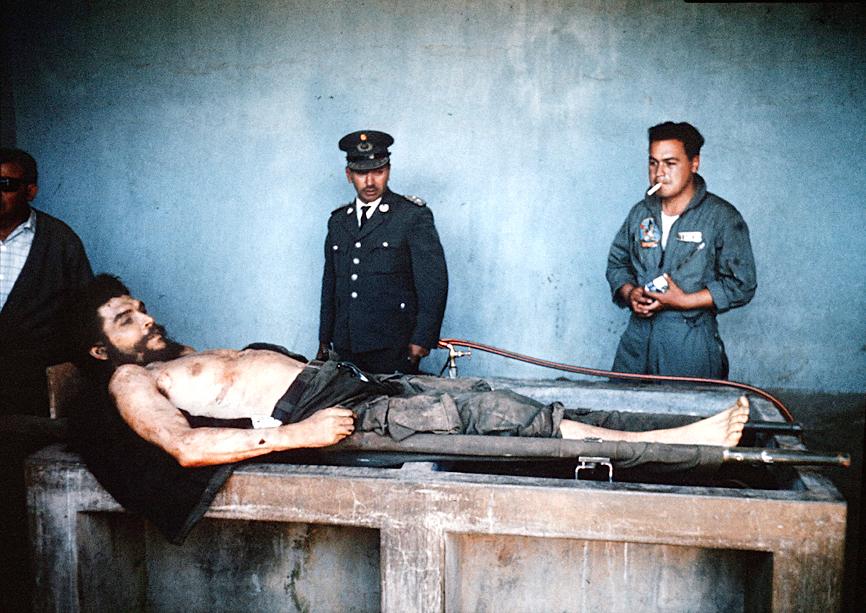The former Bolivian soldier who claimed to have shot dead Marxist revolutionary hero Ernesto “Che” Guevara died on Thursday aged 80, his relatives said.
Mario Teran Salazar shot dead Argentine-born Guevara on Oct. 9, 1967, in Bolivia’s eastern Santa Cruz Province at the height of the Cold War.
“He died. He was ill and nothing could be done,” Gary Prado, a former Bolivian soldier who helped capture Guevara in the jungle region 54 years ago said.

Photo: AFP
“The family and comrades from the armed forces told me because he was being treated in the military hospital” in the eastern city of Santa Cruz de la Sierra.
The hospital declined to comment on Teran’s death due to “medical confidentiality.”
Guevara was captured on Oct. 8, 1967, by the Bolivian army with help of two Cuban-American CIA agents.
Guevara was leading a small band of guerrillas fighting against the army.
An injured Guevara was brought to an abandoned school in the village of La Higuera where he spent the night. The next day he was riddled with bullets by Teran, with the approval of then-Bolivian president Rene Barrientos, a fervent anti-communist.
“That was the worst moment of my life. At that moment Che looked big, huge, enormous. His eyes were shining intensely,” Teran later said.
“I felt that he was on top of me and when he fixed my gaze I felt dizzy. I thought that with a single quick movement Che could disarm me,” he said.
“‘Be calm,’ he told me, ‘and aim well. You are going to kill a man.’ So I stepped back towards the doorway, closed my eyes and fired,” he said.
Guevara, who was just 39, became a legend as his inert body with open eyes was displayed like a trophy in the neighboring town of Vallegrande, a moment immortalized by Agence France-Presse photographer Marc Hutten.
After 30 years of army service, Teran retired into anonymity.
He even went so far as to deny that he killed Guevara.
Born in Rosario, Argentina, Guevara studied medicine and then traveled throughout Latin America.
He met the Cuban brothers Fidel and Raul Castro in Mexico and joined their revolutionary army that took power in Cuba in 1959, ousting US-backed dictator Fulgencio Batista.

Four people jailed in the landmark Hong Kong national security trial of "47 democrats" accused of conspiracy to commit subversion were freed today after more than four years behind bars, the second group to be released in a month. Among those freed was long-time political and LGBTQ activist Jimmy Sham (岑子杰), who also led one of Hong Kong’s largest pro-democracy groups, the Civil Human Rights Front, which disbanded in 2021. "Let me spend some time with my family," Sham said after arriving at his home in the Kowloon district of Jordan. "I don’t know how to plan ahead because, to me, it feels

Polish presidential candidates offered different visions of Poland and its relations with Ukraine in a televised debate ahead of next week’s run-off, which remains on a knife-edge. During a head-to-head debate lasting two hours, centrist Warsaw Mayor Rafal Trzaskowski, from Polish Prime Minister Donald Tusk’s governing pro-European coalition, faced the Eurosceptic historian Karol Nawrocki, backed by the right-wing populist Law and Justice party (PiS). The two candidates, who qualified for the second round after coming in the top two places in the first vote on Sunday last week, clashed over Poland’s relations with Ukraine, EU policy and the track records of their

‘A THREAT’: Guyanese President Irfan Ali called on Venezuela to follow international court rulings over the region, whose border Guyana says was ratified back in 1899 Misael Zapara said he would vote in Venezuela’s first elections yesterday for the territory of Essequibo, despite living more than 100km away from the oil-rich Guyana-administered region. Both countries lay claim to Essequibo, which makes up two-thirds of Guyana’s territory and is home to 125,000 of its 800,000 citizens. Guyana has administered the region for decades. The centuries-old dispute has intensified since ExxonMobil discovered massive offshore oil deposits a decade ago, giving Guyana the largest crude oil reserves per capita in the world. Venezuela would elect a governor, eight National Assembly deputies and regional councilors in a newly created constituency for the 160,000

North Korea has detained another official over last week’s failed launch of a warship, which damaged the naval destroyer, state media reported yesterday. Pyongyang announced “a serious accident” at Wednesday last week’s launch ceremony, which crushed sections of the bottom of the new destroyer. North Korean leader Kim Jong-un called the mishap a “criminal act caused by absolute carelessness.” Ri Hyong-son, vice department director of the Munitions Industry Department of the Party Central Committee, was summoned and detained on Sunday, the Korean Central News Agency (KCNA) reported. He was “greatly responsible for the occurrence of the serious accident,” it said. Ri is the fourth person